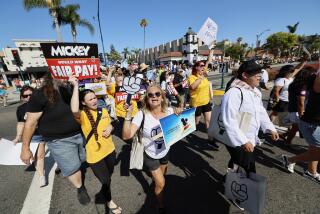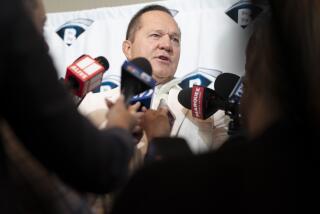2nd Baseball Strike Begins as 11th-Hr. Talks Collapse : Players Fly Home After Decision
NEW YORK — Major-league baseball players went on strike today when a last-ditch effort failed to resolve a contract dispute over the game’s salary structure.
“We are on strike,” said Gene Orza, a union lawyer. “That’s based on an assessment of where we are now and an assumption that it won’t change between now and 7 o’clock.”
Don Fehr, acting director of the players’ association, said he told players in the 26 major-league cities not to appear at any of the 13 games slated to begin tonight. Many players began booking flights home.
Mets Leaving Montreal
“We do not have an agreement,” Fehr said at the end of a negotiating session that lasted more than six hours. “Since we do not have an agreement, we are advising players not to report to stadiums tonight. There may or may not be a meeting later.”
New York Mets players, in Montreal for a three-game series, were the first to react. They began booking flights home early in the afternoon and notified the Expos’ management that they would not be present for the start of today’s game between the two teams.
The announcement followed a meeting between the two sides, called at the request of Commissioner Peter Ueberroth in an 11th-hour attempt to avert baseball’s second mid-season strike in four years.
Ueberroth, in office for just 10 months, had pleaded with the players and owners to use “the last ounce of everyone’s energy” to try to resolve the impasse.
Called ‘Serious Session’
The session was described as “very informal” at the beginning, but the two sides apparently found something to talk about. They stayed in the meeting more than six hours and, at one point, a player representative who had been in touch with union headquarters said it had turned into a “serious negotiating session.”
But after 8 1/2 months of negotiations and increasingly hard-line statements, the two sides were just too far apart.
The strike, which both sides repeatedly said they did not want but which neither could seem to avoid, was on. And baseball slammed to an abrupt halt, two months to the day from the scheduled end of the season.
The 1981 strike, the first mid-season walkout ever by pro athletes in the United States, ripped 50 days and 712 games from the middle of the schedule.
Free Agency Issue
The issue that time was free agency--the ability of a player to sell his services to the highest bidder. It was a right the players won in court, in a ruling striking down baseball’s reserve clause that bound a player to one team unless he was cut, traded or sold.
This time, the key again is a single issue--salary arbitration. It started in 1974, and the owners say it has helped salaries snowball to this season’s average of $363,000 a player.
The players set the Aug. 6 strike deadline July 15, the day before the 56th All-Star Game in Minneapolis. At the time, everyone expressed optimism that a settlement would be reached in the succeeding three weeks.
But positions hardened, rhetoric grew louder and on Monday, with those three weeks reduced to less than 24 hours, no formal negotiations were held.
More to Read
Go beyond the scoreboard
Get the latest on L.A.'s teams in the daily Sports Report newsletter.
You may occasionally receive promotional content from the Los Angeles Times.










